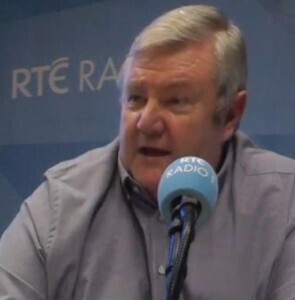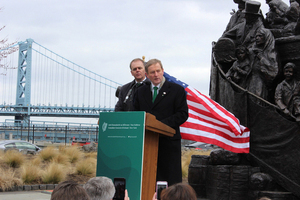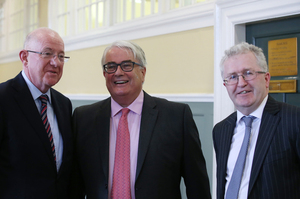From top: Leader of the Democratic Unionist Party (DUP) Jeffrey Donaldson (left) with Taoiseach Micheál Martin at Government Buildings in Dublin last August; Derek Mooney
The latest intrigues of Jeffrey Donaldson and the DUP bring to mind the adage:“You can get an awful sting from a dying bee.”
We may well be watching the final throes of Unionist ascendency as the DUP struggles to deal with a fraught situation entirely of its own making.
Last year’s celebration of Northern Ireland’s centenary reminded us how the net impact of five decades of Unionist rule was to undermine the very hegemony that brought it into existence. When Northern Ireland was established in 1921, around 62% identified as Protestant and 34% identified as Roman catholic. This figure remained steady up to the late 1960s when the proportion of Catholics began to increase.
By 2011, 41% were identifying as Catholic and just 42% identifying as Protestant share. A major shift. It was one of two shifts. The other was the emergence of a third category, one where people did not identify as being from either community background, a category that measured 17%.
A decade later, the June 2020 study, Political Attitudes at a Time of Flux, found that this “neither” category was now the biggest of the three categories of political identity, with almost 40% identifying as neither unionist nor nationalist.
Before I go any further let me explain that I dislike using the labels protestant/catholic when talking about political identity. It is a crude measure of political fealty, but you find yourself having no real alternative when trying to draw comparisons over time, especially in what was a sectarian state.
“Religion” matters in Northern Ireland as a pointer to community background, not theological principle. But not every Protestant is a unionist. No more than every Catholic backs reunification. Though this is not equally true.
Polling, especially pre-Brexit, has showed protestant support for the Union, at much higher levels (90%) than catholic support for Irish unity (55-60%). The already mentioned June 2020 study found that more Catholics now self-identify as strongly nationalist than previously. While eight out of 10 nationalists believe a United Ireland is more likely because of Brexit.
So, while the number of “other/neither” grows; the number of nationalists increases slightly and the number of unionists steadily dwindles, the variances in commitment to the Union with Britain should still mean that Northern Ireland’s place within the United Kingdom remains secure for a few more years.
But Unionism – particularly the Jim Allister’s TUV and Donaldson’s DUP – won’t accept Yes for an answer – especially when that Yes is dependent on non-unionists. Rather than recognising how their push for a purist Brexit might alienate those in the “neither” and “nationalist” categories who were content for the North to remain part of the UK, the TUV and DUP march backward in search of a long-disappeared supremacy.
Instead of pursuing a Brexit that can work for Northern Ireland they chose to hitch their wagon to the Eurosceptic rump of a United Kingdom which, as DUP MP, Ian Paisley Jr., told the House of Commons last Monday, is currently led by:
“…Conservative and Unionist party that governs this nation is actually an English nationalist party that is concerned not about a border in the Irish sea but about a red wall on the mainland island…”
The DUP, which we were once led to believe was a disciplined, savvy, and astute political party that ran rings around its rivals, now shows itself to be a naïve rabble. The party of Paisley Sr is so diminished that it both willing to believe any old lie, once delivered in Etonian or Harrovian tones, and ready to destroy anyone in its own ranks who dares to recognise that it’s not 1950 anymore.
The current leadership of DUP must realise, just as the such leaders of loyalism as David Ervine and David Adams grasped over three decades ago, that Northern Ireland is not as British as Finchley (to misquote Margaret Thatcher’s Nov, 1981, parliamentary speech).
Not even she believed that. Her Northern Ireland Secretary, Peter Brooke declared in 1990 that the Thatcher Government had “no selfish economic or strategic interest” in Northern Ireland and that should the majority vote for unification, they would consent.
Thus the idea that the Protocol creates an Irish Sea frontier that never previously existed, is a fiction. There has always been a constitutional and legal frontier down the Irish Sea. The 1801 Act of The Union gave Ireland a separate and autonomous Exchequer, Courts of Justice, and civil service. The 1921 partition of the island maintained Northern Ireland as a separate constitutional entity. Even the 1972 introduction of “direct rule” never integrated the Six Counties fully within the UK.
Northern Ireland has always been different. Ask anyone who has flown from London to Belfast. I am old enough to remember the separate boarding areas and security protocols at London airports for Ireland and Northern Ireland only.
The DUP knows this. Indeed it depended on this very separation to have its restrictive laws on abortion and gay marriage. All the Northern Ireland Protocol has done is to superimpose a new layer on an existing constitutional border. A layer that the EU still endeavours to make as gossamer-thin as possible.
So, just at the point when Northern Ireland is set to reap the benefit of a special status delivered by Dublin and Brussels, one that gives the province access to the UK and EU markets, the DUP concludes that delivering a boost to the North’s economy is not as important as satisfying its own hardliners.
Why now? Because the DUP now has the TUV doing to it; what it did to David Trimble’s UUP, post-Good Friday Agreement. It has learned nothing from its own lived history.
Neither has it grasped the basic truth that it cannot have both a hard-line Brexit and strong Union with Britain in a province that voted to remain in the EU. The DUP is refusing to face up to the changed reality of today’s Northern Ireland and see that they need the consent and support of those who voted Remain to keep Northern Ireland in the United Kingdom and that they must accept compromises on Brexit to keep the previous Union.
They act and speak as if the last 50+ years had never happened. Over the past few weeks we have had the political obscenity of Sir Jeffrey Donaldson corrupting the consent principle that underpins the Good Friday Agreement and attempting to re-writing consent to mean that nothing can happen in Northern Ireland until it has the majority consent of unionism alone.
So Donaldson’s consent moves from being “the consent of a majority of the people of Northern Ireland”, as set out six times in the text of the Good Friday Agreement, to being the consent of a majority of a minority. A unionist veto over the majority. Almost Verwoerdian.
This poses a major headache for Dublin and one that will go on for some time. The collapse of the Northern Ireland Executive is just a very poor first act of a play that we know is going to end badly for unionism.
The second and third acts, the May Assembly election, and the post-election drama as the DUP sees its grip on power slip further, will be painful to watch. Though Unionism may attempt to cobble together a pact to give it a claim to the first Minister’s post, the legislation is clear:
(4). The nominating officer of the largest political party of the largest political designation shall nominate a member of the Assembly to be the First Minister.
(5). The nominating officer of the largest political party of the second largest political designation shall nominate a member of the Assembly to be the deputy First Minister.
Though the posts of First and Deputy First have the same power and the deputy First Minister is not subordinate to the First Minister, the symbolism of the title is important. Ironically the Good Friday Agreement envisaged the first and deputy First Ministers being elected on a joint ticket, but that was changed at the St Andrews Agreement, at the behest of the DUP. They must now live with the consequences.
Thus, it is impossible to see any speedy return of the institutions post an Assembly election, especially one in which the DUP comes back with fewer MLAs than Sinn Féin. In 2017 the DUP won just one seat more than the Shinners with the two parties only 0.2% apart. The latest poll has Sinn Féin about 5% ahead of the DUP, though this gap was 8% a few months back..
How does Dublin handle a situation where the institutions are again down and where it has no reliable or trustworthy partner in London? The Good Friday Agreement works best when both governments work together in partnership and trust. No one can seriously claim that there is any trust in Boris Johnson.
It is only a few weeks since Johnson’s government tried unsuccessfully to change the Northern Ireland Electoral Acts to the DUP’s advantage by allowing MPs to run for the Assembly.
Each week Johnson makes ever louder threats to trigger Article 16 and upend the Northern Ireland Protocol – though Johnson has over hyped this as offering his hard-line Tory and DUP Brexiteer allies an immediate relief. A political happy ending.
In reality, Article 16 does not allow either party to suspend provisions of the protocol permanently or in their entirety, indeed all Article 16 does is to commence a period of negotiation – of around three months.
Added to all of this is the complicated political situation here and in London. A bad May local election could see the Tories move against Boris – not necessarily a bad result for those wanting to see the situation in the North calm down – but it will still set the process back.
June and July are never easy times in the North during a political vacuum. A difficult marching season in which Unionism still reeling after a bad Assembly result could leave the two governments waiting until September to get people back into the same room.
But that leaves only a very small window until the preparations start in Dublin for the handover from Taoiseach Martin back to Taoiseach (we assume) Varadkar.
Will that handover see Martin return to his beloved Department of Foreign Affairs as Tánaiste, replacing Simon Coveney? Who knows? If it doesn’t, it will leave Fianna Fáil with no input into Northern policy – a situation that could only gladden the likes of Sen Ned O’Sullivan.
It is therefore vital that the Irish government in the person on An Taoiseach immediately state its position, in terms that cannot be misconstrued or misinterpreted in the run up to the December changeover. A clear and unambiguous statement that firmly commits itself to the principles of the Good Friday Agreement and to getting the Institutions back up and running speedily.
Simply saying we are concerned, even deeply concerned, won’t be enough.
Derek Mooney is a communications and public affairs consultant. He previously served as a Ministerial Adviser to the Fianna Fáil-led government 2004 – 2010. His column appears here every Monday. Follow Derek on Twitter: @dsmooney








that was a good read, thanks derek.
it’s hilarious to watch the DUP go from kingmakers under May’s government to eating itself under Johnson. anyone with a sense of humour is willing the shinners to do well at the may elections..
Meanwhile, down here, Michole Martin will continue to offer comfort to the DUPsters owing to his fear and loathing of the Shinners and republicanism generally.